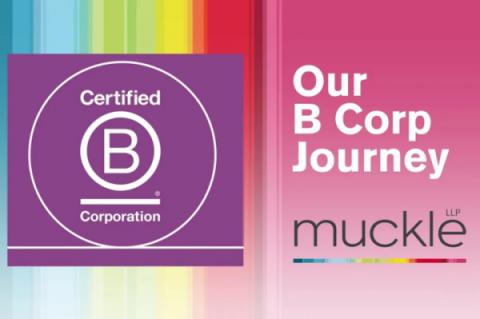Q&A: Jessica Gray on social mobility

New research from the Sutton Trust reveals that opportunity is not spread evenly across the country. More work is needed to drive social mobility and unlock new career opportunities for people from diverse socioeconomic backgrounds.
In this article, Jessica Gray, a solicitor in our real estate team, explains how her experience of social mobility impacted her path to becoming a qualified solicitor.
What made you want to pursue a career in law?
I decided to pursue a career in law during my history degree. I chose history as my undergraduate degree as it was my favourite subject throughout school and sixth form. Whilst I wasn't sure which career path was right for me when applying for university, I knew that a history degree would allow me to develop key skills I could apply to a range of careers.
After attending a careers fair at university, I applied for a vacation scheme at a commercial law firm. During this two-week placement, I enjoyed applying the skills I was developing in my degree (such as research and drafting) with the people skills I had from my part-time work as a shop assistant and waitress. From that point, I decided to pursue a career in law.
Have you encountered any obstacles entering the legal profession?
As anyone who has applied for a training contract knows, the path to a training contract is not an easy one. My main concern about entering the legal profession was my lack of legal work experience, especially as I was applying with a non-law degree.
During my undergraduate degree, a careers adviser recommended that I speak to family friends who could potentially offer some legal work experience, as they noted this would be difficult to find without any personal connections.
I was disappointed and frustrated at this advice, as I did not have any connections in the legal industry and was worried that this would be a barrier to securing a training contract. When participating in vacation schemes and assessment days, it was difficult not to compare my own non-legal background with candidates who had years of experience in the legal sector.
How did you overcome this?
As I was unable to secure work experience in a law firm, I decided to volunteer as a legal adviser at Citizens Advice one day a week. This role involved offering free legal advice to members of the public on a range of issues. During this role, I gained insight into certain legal areas (such as employment and commercial disputes). I also developed my communication and client skills, especially when dealing with sensitive legal issues and emotional situations.
I was able to apply this experience during my training contract applications to show my interest in the legal profession and my ability to offer legal advice. I would recommend volunteering roles at similar not-for-profit organisations for anyone struggling to find experience in a traditional law firm.
Approximately 50% of solicitors come from non-legal backgrounds (1), and whilst legal experience is great, it is definitely not the most important factor when it comes to applications. During my interview at Muckle, I found myself talking mostly about my experience as a waitress; this demonstrated key skills that solicitors use every day (such as balancing a range of tasks in a busy working environment and learning to handle difficult situations with customer care).
Do you think the legal sector is becoming more accessible to individuals from diverse backgrounds? Why or why not?
Statistics published by the SRA (2) in January 2025 indicate that social mobility is improving. For example, the percentage of lawyers from an intermediate socio-economic background has increased from 5% in 2019 to 13% in 2023, and the proportion of lawyers attending fee-paying schools has decreased from 23% in 2015 to 21% in 2023.
However, the proportion of lawyers from a lower socio-economic background has reduced from 21% in 2015 to 18% in 2023, and the largest firms still have the greatest proportion of lawyers who attended fee-paying schools (at 28%).
Furthermore, new research from the Sutton Trust (3) highlights that the top 20 constituencies with the best social mobility in England are all in London. This indicates that other cities in the UK are not offering the same economic opportunities, with Newcastle upon Tyne Central and West ranking the lowest..
Whilst there have been some changes in the legal profession, there is still a long way to go to make the legal sector more accessible. I think the key to making the legal sector more accessible is education and awareness.
During my secondary school education, I admittedly had a very limited knowledge of the legal profession, especially the commercial sector. Careers fairs at my secondary school were uninspiring, with a very limited range of businesses in attendance.
My secondary school history teacher encouraged me to apply for university, and he reassured me that a wider range of careers would become apparent once I attended university. Whilst my teacher was correct, many students at state schools may not have this kind of guidance. This is why it is important for commercial firms to reach out and offer career insights to these schools, as a brief conversation could be the catalyst in inspiring students from less privileged backgrounds to pursue a career in law. Prioritising social mobility is important to improve the opportunities available to hard-working students, regardless of their background, as well as creating a diverse workforce that can offer a more rounded service for our clients.
How does Muckle support its employees across a range of backgrounds?
As part of Muckle’s social diversity strategy, we are now reaching out to schools where the percentage of students claiming free school meals is higher than the national average to offer career talks and attendance at careers fairs. I think this is a great step in the right direction to engage with talented students from a lower socio-economic background.
A brief introduction to a career in law could encourage students to research the opportunities available in the legal profession at a young age. Muckle is also expanding its work experience programmes to ensure our one-week placements are offered to a more diverse range of schools and students in the North East.
Muckle was also a trailblazer in the North East Solicitor Apprenticeship (NESA) programme. The NESA scheme is a six-year programme allowing apprentices to gain experience in a range of different teams, whilst also studying for their legal qualifications one day per week. This scheme allows students who may not have the means to attend university to start a career in law.
There are many reasons young people choose not to attend university, whether this is because of caring obligations or the substantial costs of an undergraduate degree. The NESA scheme offers an alternative route into law and, as the scheme grows, I think it will be a fundamental part of improving social mobility in the commercial legal profession.
Facilitating social mobility, especially in the North East, still requires a lot of work. By engaging in this conversation, commercial firms can make a real difference by reaching out to students from diverse socio-economic backgrounds and demonstrating the opportunities available in the legal profession.
References:
(1) https://www.lawcareers.net/Explore/LCNSays/Why-non-law-students-make-really-great-lawyers
(2) https://www.sra.org.uk/sra/equality-diversity/diversity-profession/diverse-legal-profession/
(3) https://www.suttontrust.com/our-research/the-opportunity-index/
Muckle’s social mobility strategy
Additional initiatives include:
· Supporting the North East Combined Authority, which aims to provide law teachers from Durham Sixth form with a visit to businesses to help enhance careers-curriculum links.
· Partnering with Esh Group for part of the Building My Skills Programme which is a structured careers information and employability programme.
· Running our Inspiring Careers programme, which is a unique opportunity designed exclusively for high-achieving students from lower socio-economic backgrounds.
For information on any of the social mobility initiatives mentioned in this article, please contact [email protected]
Our B Corp journey
We are so proud to be the first law firm in the North East and Cumbria to become B Corp Certified™. But how did we do it? We've put together this short animation video covering B Corp's pillars: Governance, Community, People, Environment, and Clients.
Watch VideoAll Videos
